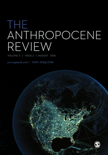
Anthropocene Review
metrics 2024
Charting the Course of Our Planet's Transformation
Introduction
Anthropocene Review is a prominent academic journal published by SAGE Publications Inc. that focuses on the interdisciplinary study of the Anthropocene—a term used to describe the significant global changes resulting from human activity. Launched in 2014 and forming part of its converged years until 2024, this journal has quickly established itself as an essential resource for researchers and professionals in the fields of Ecology, Geology, and Global and Planetary Change, as evidenced by its notable Q2 and Q3 rankings in these categories. With a solid Scopus ranking placing it within the top tiers of Earth and Planetary Sciences and Environmental Science disciplines, the Anthropocene Review aims to shed light on the complex interactions between human actions and the environment, fostering a deeper understanding of sustainability and ecological impacts. While currently not an open-access journal, it provides crucial research findings and theoretical advancements that appeal to students and academics alike, shaping the discourse on our planet's future.
Metrics 2024
 0.66
0.66 2.50
2.50 3.20
3.20 35
35Metrics History
Rank 2024
Scopus
IF (Web Of Science)
JCI (Web Of Science)
Quartile History
Similar Journals

Neotropical Biodiversity
Championing biodiversity for a sustainable tomorrow.Neotropical Biodiversity is a prominent journal dedicated to advancing our understanding of biodiversity and ecological dynamics within the Neotropical region. Published by TAYLOR & FRANCIS LTD in the United Kingdom, this Open Access journal has been providing unrestricted access to research findings since 2015, fostering collaboration and knowledge sharing among the global scientific community. With an emphasis on innovative research in Ecology, Ecology, Evolution, Behavior and Systematics, and Global and Planetary Change, it has earned a reputation for excellence, currently holding a Q3 category in its field. As of 2023, the journal ranks in the 37th percentile for Environmental Science (Ecology) and in the 36th percentile for Agricultural and Biological Sciences (Ecology, Evolution, Behavior and Systematics), making it a valuable resource for researchers, professionals, and students interested in understanding and preserving biodiversity in one of the world's most diverse ecosystems. We invite you to explore the cutting-edge research published in Neotropical Biodiversity and contribute to the ongoing dialogue for environmental sustainability and ecological resilience.
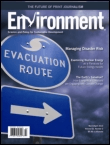
ENVIRONMENT
Shaping Tomorrow's Environmental Policies TodayENVIRONMENT is a premier journal published by Routledge Journals, Taylor & Francis Ltd, focusing on interdisciplinary studies in the field of environmental science. With the ISSN 0013-9157 and E-ISSN 1939-9154, this journal serves as a vital platform for the dissemination of high-quality research and innovative ideas that address contemporary environmental challenges. Spanning over five decades since its inception in 1969, the journal boasts an impressive impact factor and is recognized in multiple prestigious categories: Q1 in Environmental Engineering and Water Science and Technology, as well as Q2 rankings in Global and Planetary Change and Renewable Energy, Sustainability, and the Environment. Covering a diverse scope from ecological studies to sustainable technologies, it attracts a global readership comprised of researchers, professionals, and students committed to driving progress in environmental sustainability. Although currently not an open-access journal, it offers essential insights and empirical findings crucial for policy development and practical applications in the world of environmental science. The journal not only contributes to scholarly discourse but also plays a significant role in shaping future research directions and fostering a deeper understanding of the intricate relationships between humans and their environment.

Nature + Culture
Illuminating the Nexus of Nature and Human ExperienceNature + Culture, published by BERGHAHN JOURNALS, focuses on the interdisciplinary exploration of cultural and environmental relationships, bridging the gap between the social sciences and ecological studies. With its ISSN 1558-6073 and E-ISSN 1558-5468, this journal has established itself as a key platform for scholars aiming to advance discussions in an era of rapid environmental change and cultural transformation. Operating from the United States, specifically at 20 Jay St, Suite 512, Brooklyn, NY 11201, it holds a respectable position within the academic community, evidenced by its Q3 ranking in Social Sciences (miscellaneous) for 2023 and its Scopus rank of #132 out of 275 in General Social Sciences. While currently not an Open Access journal, Nature + Culture provides vital insights that address the pressing issues of our time, making it an essential resource for researchers, professionals, and students committed to understanding the intersection of nature and human culture from 2008 through its converging years into 2024.

NORTHWEST SCIENCE
Bridging regional insights with global implications.NORTHWEST SCIENCE, published by the NORTHWEST SCIENTIFIC ASSOCIATION, serves as a vital resource for researchers and professionals in the fields of ecology, evolution, and systematics. With an ISSN of 0029-344X and an E-ISSN of 2161-9859, this journal has been disseminating valuable scientific insights since its inception in 1975 and continues to do so into 2024. Although currently positioned in the Q4 quartile for its category, it plays a crucial role in advancing the understanding of ecological and biological sciences, reflecting a diverse range of studies and methodologies. Researchers will find the journal particularly appealing due to its emphasis on regional studies and their implications on a global scale. While NORTHWEST SCIENCE is not an open-access publication, it provides significant contributions to the academic dialogue within its discipline, making it an essential addition to the library of any dedicated researcher, student, or professional in the environmental sciences.
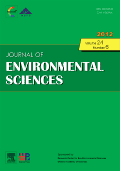
Journal of Environmental Sciences
Exploring Solutions to Global Environmental ChallengesJournal of Environmental Sciences, published by SCIENCE PRESS, is a premier scholarly journal dedicated to advancing knowledge in the multidisciplinary fields of environmental science, environmental chemistry, and environmental engineering. Established in 1970 and based in Beijing, China, this journal has consistently garnered recognition for its high-quality research, demonstrated by its Q1 rankings across multiple categories, including Environmental Chemistry, Environmental Engineering, and General Environmental Science. With an impressive Scopus rank of #11 for Environmental Science, the journal has firmly positioned itself within the top tier of its field, attracting contributions from leading researchers and academics worldwide. Although it operates under subscription access, the journal's commitment to disseminating critical insights into pressing environmental issues makes it an invaluable resource for professionals, researchers, and students striving to make impactful contributions to the understanding and management of environmental challenges.

Geosciences
Bridging Ideas and Discoveries in Earth Sciences.Geosciences is a prestigious open-access journal published by MDPI, dedicated to advancing research in the field of Earth and Planetary Sciences. Since its inception in 2011, this journal has fostered a collaborative environment for the dissemination of innovative ideas and findings, contributing significantly to the academic community's understanding of complex geological processes. The journal has achieved a commendable 2023 ranking in the second quartile (Q2) within its category, highlighting its impact and relevance in the field, with a Scopus rank of #41 out of 195 journals, placing it in the 79th percentile. With an aim to span a broad range of topics from environmental geology to planetary exploration, Geosciences is pivotal for researchers, professionals, and students looking for an accessible platform to share their work and stay informed of the latest developments. As a fully open-access journal, it ensures that high-quality research is freely available, fostering greater dissemination of knowledge across the globe.
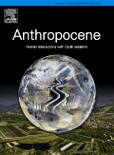
Anthropocene
Pioneering Research in the Age of Human InfluenceAnthropocene, published by Elsevier Science Ltd, is a leading journal dedicated to the interdisciplinary study of the Anthropocene epoch, focusing on the profound impacts of human activity on Earth systems and ecosystems. With an impressive impact factor reflected in its Q1 rankings in Earth and Planetary Sciences and Ecology, as well as a solid standing in Global and Planetary Change, this journal is a vital resource for researchers, professionals, and students striving to understand and address the pressing environmental challenges of our time. Since its inception in 2013, the journal has been committed to publishing high-quality, peer-reviewed articles that stimulate critical discourse and inspire innovative solutions to complex ecological issues. Although not an open-access journal, Anthropocene provides extensive access options through institutional subscriptions, making its significant research readily available to the academic community. Based in the United Kingdom, the journal serves as a cornerstone for scholarship in a rapidly evolving field, bridging gaps across disciplines and encouraging interdisciplinary collaboration for a sustainable future.

ENVIRONMENT AND HISTORY
Advancing Interdisciplinary Insights on Environmental ChangeENVIRONMENT AND HISTORY is a distinguished academic journal published by WHITE HORSE PRESS, focusing on the interdisciplinary study of environmental history and the intricate relationships between human societies and their environments. With an ISSN of 0967-3407 and an E-ISSN of 1752-7023, this journal serves as a vital platform for researchers, professionals, and students engaged in Arts and Humanities, Environmental Science, and Geography. Released in the United Kingdom, ENVIRONMENT AND HISTORY has been contributing to scholarly discourse since 1995 and continues to thrive with its current scope extending to 2024. The journal boasts impressive Scopus rankings, notably a 89th percentile in the field of History within the Arts and Humanities category. Although it operates without open access, the insights and findings published within its pages are invaluable to understanding historical contexts that influence current environmental challenges. Researchers and students alike can benefit from the journal's commitment to high-quality academic standards, reflected in its Q2 and Q4 categorizations across multiple subjects.
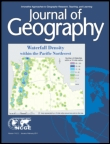
JOURNAL OF GEOGRAPHY
Navigating the Intersections of Geography and EducationJOURNAL OF GEOGRAPHY is a premier academic publication dedicated to advancing knowledge in the fields of geography, planning, and education. Published by TAYLOR & FRANCIS INC in the United Kingdom, this journal boasts an impressive history since its inception in 1902 and is recognized for its commitment to scholarly excellence, as evidenced by its Q1 ranking in Earth-Surface Processes, Education, and Geography, Planning and Development categories for 2023. With Scopus rankings placing it in the top tiers of its respective fields, researchers and professionals are encouraged to engage with cutting-edge research that explores the complexities of spatial relationships and environmental processes. While the journal does not currently offer Open Access options, it serves as an essential resource for academics looking to contribute to the dialogue on pressing geographic issues. Located at 530 Walnut Street, Ste 850, Philadelphia, PA 19106, the JOURNAL OF GEOGRAPHY is devoted to fostering an understanding of the dynamic interactions shaping our world, making it a vital platform for those dedicated to geographic inquiry.

Visnyk of V N Karazin Kharkiv National University-Series Geology Geography Ecology
Exploring the intricate connections of geology, geography, and ecology.Visnyk of V N Karazin Kharkiv National University-Series Geology Geography Ecology is a prominent academic journal dedicated to the fields of geology, geography, and ecology. Published by the esteemed V N Karazin Kharkiv National University, this journal aims to disseminate high-quality research findings and theoretical perspectives that advance understanding in these critical scientific areas. With the ISSN 2410-7360 and E-ISSN 2411-3913, it serves as a vital platform for scholars, researchers, and students striving to contribute to environmental science and sustainable development. The journal promotes open access, ensuring that research is readily accessible to a broad audience, thus facilitating the exchange of knowledge across borders. Its commitment to scholarly excellence makes it an essential resource for anyone engaged in the study of Earth's systems and their interconnections. For additional information and to submit your research, please visit the journal's website.